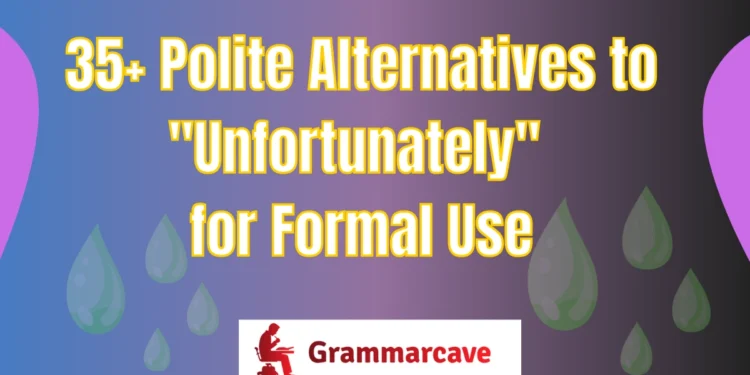Selecting the proper terminology in formal correspondence is essential for empathy and discretion, especially when delivering undesirable information or updates. Choosing the right words creates an impression as it shows carefulness and trust, thus making the recipient feel cherished. In this article, we will provide different considerate substitutes for the term ‘unfortunately,’ along with detailed descriptions, illustrations, and helpful advice. These approaches will allow you to enhance your messages to make them more tailored, polished, and kind.
Is It Professional/Polite to Say “Unfortunately”?
As for the business setting, using the word unfortunately while conveying bad news or in rejection letters is polite and professional because it shows concern for the receiver’s sentiments while softening the blow. Everyone in business correspondence, customer service, and formal communication strives for a respectful tone, which, unfortunately, helps to achieve. Any overly helpful word has its downside as it makes the text seem monotonous or impersonally polite,” thus, switching words (regrettably, we are sorry to inform you) assists that imbalance. Other approaches may be warranted for urgent or significant matters. In any case, “unfortunately” serves as a reliable diplomatic instrument provided it’s well considered.
What Does “Unfortunately” Mean?
“Unfortunately” is an adverb expressing disappointment or bad news concerning a situation. It marks that either something negative has occurred or that something which was intended has not happened. Softeners such as this make rejection, delay, or problems more polite and considerate, less harsh. An example is, “Unfortunately, your application was denied”; in this case, it conveys feeling but sympathy while delivering bad news. In formal communication, being useful unfortunately broadens the scope to inform and personal setting. Overusing it in specific contexts can make messages sound disingenuous and monotonous.
Advantages of Saying “Unfortunately”
- Softens Negative News—It makes rejections, delays, or problems sound less harsh, maintaining a polite tone. (Example: “Unfortunately, we cannot approve your request at this time.”)
- Shows Professionalism & Tact—In business and customer service, it helps convey bad news diplomatically without sounding abrupt.
- Expresses Empathy—Acknowledges the listener’s disappointment, making them feel heard rather than dismissed.
- Maintains Positive Relationships—Reduces friction in communication, preventing the recipient from feeling attacked or ignored.
Disadvantages of Saying “Unfortunately”
- Can Sound Impersonal or Scripted—Overuse (especially in corporate emails) may come across as insincere or robotic.
- Weakens Urgency in Critical Situations— In emergencies or serious issues, indirect phrasing (“Unfortunately, there’s a problem”) may delay action.
- May Seem Passive or Evasive—If overused, it can frustrate people who prefer directness (“We can’t fix this” vs. “Unfortunately, we’re unable to”).
- Loses Impact When Repeated—Starting multiple sentences with “unfortunately” dilutes its effect and feels monotonous.
1. As luck would have it
Meaning: By chance; coincidentally, often used ironically for bad luck.
Definition: An idiom used to introduce an event that happened purely by chance, frequently with an ironic twist implying misfortune.
Explanation: This phrase often carries heavy irony—it usually signals that bad luck intervened. The contrast between the words and the negative outcome creates irony.
Example: I needed a quiet day to write; as luck would have it, the neighbors decided to start demolition work.
Best for: To convey ironic misfortune or frustrating coincidence in a somewhat wry.
Worst for: For genuinely good luck (though possible, it’s rare).
Tone: Ironic, wry, resigned, conversational, often humorous (darkly or lightly).
2. Disappointingly
Meaning: In a manner that causes disappointment.
Definition: An adverb that describes something that fails to meet expectations, leading to a letdown.
Explanation: This phrase focuses on the quality or nature of something that is below expectations. It describes how something was (disappointingly slow, disappointingly weak).
Example: Disappointingly, sales figures fell far short of projections.
Best for: When critiquing performance, results, or quality that didn’t meet anticipated standards. Common in reviews, reports, and evaluations.
Worst for: For shocking news or profound sadness.
Tone: Critical, evaluative, analytical, understated disappointment.
3. Dismally

Meaning: Gloomily or depressingly; extremely badly.
Definition: Describes something done in a cheerless or depressing way but that is very unsuccessful or of very low quality.
Explanation: This poem evokes a sense of gloom and doom. It describes the mood (dismally grey sky) and the outcome/quality (dismally failed attempt).
Example: The experiment dismally failed to produce any results.
Best for: To convey a depressing atmosphere or a complete, gloomy failure. Stronger than disappointingly.
Worst for: For minor setbacks or neutral situations.
Tone: Gloomy, depressing, pessimistic, emphasizing failure or bleakness.
4. Ill-fatedly
Meaning: In a manner destined to end badly; unluckily.
Definition: Suggests an action or endeavor was doomed from the start.
Explanation: Implies a sense of destiny or inevitability about failure. Often dramatic or literary.
Example: The climbers set out ill-fatedly just as the weather forecast worsened.
Best Use: In storytelling or retrospect, describing doomed ventures.
Worst Use: For minor setbacks or everyday accidents.
Tone: Dramatic, fatalistic, literary.
5. In a regrettable manner
Meaning: Done in a way that causes regret, unfortunately.
Definition: A formal phrase emphasizing that the action is the source of regret.
Explanation: Similar to regrettably, but more focused on how something was done.
Example: The announcement was handled regrettably, causing unnecessary panic.
Best Use: Formal contexts criticizing how something was done.
Worst Use: Casual conversations or minor matters.
Tone: Highly formal.
6. Sadly for us
Meaning: Unfortunately for us, to our sorrow or disadvantage.
Definition: States that an unfortunate outcome negatively affected the speaker’s group.
Explanation: Combines personal impact with general regret in a more conversational tone.
Example: Sadly for us, she accepted another offer before we could respond.
Best Use: Casual or semi-formal contexts expressing shared disappointment.
Worst Use: Tragedies where others suffered more seriously.
Tone: Conversational, resigned, explanatory, mildly regretful.
7. Unfortunately for us
Meaning: Bad luck or an unwelcome outcome affecting our group.
Definition: Highlights misfortune specifically impacting the speaker’s team/community.
Explanation: Personalizes bad news – we’re the unlucky ones. Casual yet vivid.
Example: The rain started just as we began the outdoor ceremony. Unfortunately for us, the backup tent leaked too.
Best for: Casual storytelling; minor group inconveniences.
Worst for: Major tragedies (feels trivializing).
Tone: Resigned, mildly ironic, collective, ugh.
8. To our chagrin
Meaning: To our annoyance or embarrassment.
Definition: Mixes disappointment with irritation or humiliation.
Explanation: When failure stings extra, you’re let down and flustered.
Example: To our chagrin, the rival team discovered our secret strategy before the game.
Best for: Professional blunders, avoidable mistakes.
Worst for: Deep grief (tone is too prickly).
Tone: Annoyed, embarrassed, mildly defensive.
9. To our despair
Meaning: To our utter hopelessness.
Definition: Signals crushing defeat with no visible solution.
Explanation: The heaviest of the two phrases implies shattered hope.
Example: To our despair, the rescue team confirmed the lost hikers couldn’t be found.
Best for: Profound losses, irreversible outcomes.
Worst for: Everyday setbacks (overly dramatic).
Tone: Devastated, hollow, grief-stricken.
10. To our great sorrow
Meaning: To our profound sadness.
Definition: Formal expression of communal mourning.
Explanation: Reserved for events that leave a group emotionally raw.
Example: To our great sorrow, the village elder who preserved our traditions passed away.
Best for: Deaths, cultural losses, legacy tragedies.
Worst for: Minor inconveniences (insensitive).
Tone: Elegiac, reverent, deeply mournful.
11. To our great regret
Meaning: With our profound remorse.
Definition: Admits responsibility for a severe misstep.
Explanation: “Great” intensifies ownership – we caused this pain.
Example: To our great regret, the software update accidentally deleted user data.
Best for: Corporate apologies, institutional failures.
Worst for: Situations beyond control (disingenuous).
Tone: Guilty, accountable, somber.
12. To Our Deep Regret
Meaning: With our sincere remorse.
Definition: A formal, heartfelt apology.
Explanation: Deep adds emotional weight, which implies lasting impact.
Example: To our deep regret, the event headliner was canceled at the last minute due to illness.
Best for: High-stakes letdowns (weddings, conferences).
Worst for: Trivial errors (“deep regret we’re out of kale”).
Tone: Poignant, earnest, apologetic.
13. To Our Profound Disappointment
Meaning: To our intense letdown.
Definition: For when expectations were sky-high and utterly crushed.
Explanation: Profound = deeply felt by all.
Example: To our profound disappointment, the lab results disproved the breakthrough theory. Best for: Failed passion projects, scientific setbacks.
Worst for: Small inconveniences (hyperbolic).
Tone: Crushed, disillusioned, heavy.
14. To Our Utter Dismay
Meaning: To our complete horror/shock.
Definition: The most intense version of dismay – implies chaos or disaster.
Explanation: Utter = total, leaving no room for hope.
Example: To our utter dismay, the floodwaters breached the final barrier.
Best for: Natural disasters, irreversible crises.
Worst for: Manageable problems (melodramatic).
Tone: Desperate, overwhelmed, shell-shocked.
15. To Our Collective Disappointment
Meaning: To the shared letdown of our group.
Definition: Neutral term for group expectations unmet.
Explanation: Focuses on unity in dissatisfaction.
Example: To our collective disappointment, the board vetoed the staff’s proposal.
Best for: Organizational decisions and team projects.
Worst for: Personal failures (impersonal).
Tone: Unified, resigned, democratic.
16. To Everyone’s Dismay
Meaning: Causing universal shock/distress.
Definition: A shared sense of alarm across a community.
Explanation: Everyone + dismay = collective gasp.
Example: To everyone’s dismay, the beloved town square tree was struck by lightning.
Best for: Community-wide bad news.
Worst for: Isolated incidents.
Tone: Stunned, communal concern.
17. To Everyone’s Regret
Meaning: Universally acknowledged as unfortunate.
Definition: A consensus that something is regrettable.
Explanation: Less emotional – focuses on shared acknowledgment.
Example: To everyone’s regret, the peace talks collapsed.
Best for: Diplomatic failures, historical missteps.
Worst for: Personal matters.
Tone: Formal, consensus-driven, diplomatic.
18. To the Disappointment of Many
Meaning: Letting down a significant (but not all) group.
Definition: A nuanced way to say some were bummed.
Explanation: Acknowledges impact without overstating reach.
Example: To the disappointment of many, the art exhibit excluded local artists.
Best for: Controversial decisions with divided reactions.
Worst for: When everyone was disappointed (understated).
Tone: Measured, journalistic, honest.
19. To the Dismay of Many
Meaning: Causing alarm among a large group.
Definition: Many + dismay = widespread concern without universality.
Explanation: Useful when reactions are strong but not total.
Example: To the dismay of many, the new law restricted press freedoms.
Best for: Polarizing policies and social changes.
Worst for: Universal crises.
Tone: Concerned, civic-minded.
20. To the Regret of Many
Meaning: Widely seen as a misstep.
Definition: Formal admission of a broad-based we messed up.
Explanation: Hints at accountability spread across a group.
Example: To the regret of many, the war memorial’s redesign erased historical names.
Best for: Institutional errors and cultural controversies.
Worst for: Blameless accidents.
Tone: Reflective, remorseful, historical.
21. To the sorrow of many
Meaning: Causing widespread sadness.
Definition: Elegiac phrase for communal mourning.
Explanation: Sorrow elevates it beyond disappointment to grief.
Example: To the sorrow of many, the ancient library burned in the riots.
Best for: Cultural losses, heritage destruction.
Worst for: Temporary setbacks.
Tone: Mournful, poetic, nostalgic.
22. Much to everyone’s disappointment
Meaning: Greatly letting down all involved.
Definition: Much intensifies the collective letdown.
Explanation: For when a group’s high hopes are spectacularly dashed.
Example: To everyone’s disappointment, the astronaut’s live feed cut out mid-walk.
Best for: Highly anticipated flops.
Worst for: Low-stakes outcomes.
Tone: Heavy sigh, communal deflation.
23. Much to everyone’s dismay
Meaning: Causing universal shock/distress.
Definition: Much + dismay = amplified collective alarm.
Explanation: The grand finale of group bad news phrases.
Example: Much to everyone’s dismay, the ceasefire collapsed within hours.
Best for: Crises with far-reaching impact.
Worst for: Minor surprises.
Tone: Grave, foreboding, urgent.
24. In a discouraging manner
Meaning: Diminishing motivation or hope.
Definition: Actions that deflate enthusiasm or confidence.
Explanation: Highlights how approach or tone actively undermines morale.
Example: The manager criticized the team discouragingly, focusing only on flaws.
Best for: Feedback situations, leadership failures.
Worst for: Situations requiring gravity (e.g., grief).
Tone: Deflating, demotivating, hope-sapping.
25. In a depressing manner
Meaning: Inducing hopelessness or low spirits.
Definition: Actions/events that drain joy or optimism long-term.
Explanation: Suggests a lingering heaviness – like emotional quicksand.
Example: The documentary depressingly portrayed climate change, offering no solutions.
Best for: Media, art, or communication that feels relentlessly bleak.
Worst for: Temporary setbacks (overly dramatic).
Tone: Gloomy, oppressive, soul-wearying.
26. In a sorrow-inducing way
Meaning: Actively causing grief or sadness.
Definition: Events/actions engineered to create sorrow.
Explanation: Implies intent or negligence so severe it manufactures pain.
Example: The eviction notices were distributed in a sorrow-inducing way just before the holidays.
Best for: Avoidable cruelty or systemic indifference.
Worst for: Natural disasters (no human intent).
Tone: Cruel, callous, heart-wounding.
27. In a regret-inducing way
Meaning: Causing deep remorse after the fact.
Definition: Actions with consequences that haunt the doer/observer.
Explanation: Focuses on the aftermath of guilt – I wish we’d done this differently.
Example: They handled the layoffs in a regret-inducing way, using impersonal automated emails.
Best for: Avoidable mistakes with ethical weight.
Worst for: Unforeseen accidents.
Tone: Haunting, ethically uneasy, hindsight-heavy.
28. In a disappointment-inducing way
Meaning: Designed or destined to let down.
Definition: Actions/events that systematically fail expectations.
Explanation: Suggests predictability – we saw this failure coming.
Example: The product launch unfolded in a disappointment-inducing way, mirroring last year’s flaws.
Best for: Repeated letdowns, preventable failures.
Worst for: First-time surprises.
Tone: Predictably underwhelming, frustrating.
29. In a cheerless manner
Meaning: Utterly devoid of joy or warmth.
Definition: Actions radiating emotional barrenness.
Explanation: Not just sad – actively resistant to light or comfort.
Example: He celebrated his birthday in a cheerless manner, alone in a dimly lit room.
Best for: Describing emotional detachment or joyless routines.
Worst for: Neutral situations.
Tone: Bleak, austere, emotionally cold.
30. In a joyless manner
Meaning: Without pleasure or satisfaction.
Definition: Mechanical actions stripped of meaning.
Explanation: Focuses on the absence of joy in obligatory tasks.
Example: The team completed the project joylessly, exhausted and undervalued.
Best for: Burnout culture, soul-crushing work.
Worst for: Passion-driven endeavors.
Tone: Weary, mechanical, devoid of spark.
31. In a grim manner
Meaning: Stern, harsh, and forbidding.
Definition: Actions radiating resolve in the face of horror.
Explanation: It is not just sad – it’s sadness armored in steel.
Example: The soldiers advanced grimly, knowing the cost ahead.
Best for: Courage in dire circumstances, unavoidable suffering.
Worst for: Petty disagreements.
Tone: Steely, resolute, tragically determined.
32. In a disheartening way
Meaning: Eroding courage or enthusiasm.
Definition: Actions that chip away at hope incrementally.
Explanation: Death by a thousand cuts – small, cumulative discouragements.
Example: Progress stalled in a disheartening way, with endless bureaucratic delays.
Best for: Systemic frustration and prolonged struggles.
Worst for: Single catastrophic events.
Tone: Wearisome, patience-testing, hope-dimming.
33. Much to everyone’s regret
Meaning: Universally acknowledged as unfortunate.
Definition: A formal phrase indicating widespread remorse about an outcome.
Explanation: This expression highlights communal ownership of the feeling—we all wish this hadn’t happened. It is less emotional than “sorrow” and more about acknowledgment.
Example: Much to everyone’s regret, the historic theater was demolished for a parking lot.
Best for: Group decisions with negative consequences (e.g., organizational changes).
Worst for: Personal failures or tragedies (too impersonal).
Tone: Formal, consensus-driven, diplomatic regret.
34. As bad luck would have it
Meaning: By unfortunate coincidence.
Definition: An idiom blaming fate for poor timing or outcomes.
Explanation: Casual and slightly fatalistic – implies luck itself conspired against you.
Example: As bad luck would have it, my flight was canceled during the only storm this month.
Best for: Everyday inconveniences with ironic timing.
Worst for: Severe tragedies (can sound flippant).
Tone: Wry, resigned, conversational.
35. By cruel fate
Meaning: Due to merciless destiny.
Definition: Personifies fate as intentionally harsh.
Explanation: Dramatic and poetic – suggests cosmic forces deliberately inflicted suffering.
Example: By cruel fate, the rescue team arrived moments after the landslide buried the village.
Best for: Literary contexts or profound, senseless tragedies.
Worst for: Minor setbacks (overly theatrical).
Tone: Melodramatic, poetic, accusatory (toward destiny).
FAQs
Q1. Do I need a comma after “unfortunately”?
Yes, when it starts a sentence (“Unfortunately, …”).
Q2. Is “unfortunately” overused?
It can be; vary with synonyms like “regrettably.”
Q3. How do I say “unfortunately” in a business email?
We regret to inform you or After reviewing, we’re unable to
Q4. Is “unfortunately” too negative for customer service?
No, but pair it with solutions (e.g., “Unfortunately, X isn’t available, but we can offer Y.”).
Q5. Should I avoid “unfortunately” in job rejections?
No, but balance it with encouragement (“Unfortunately, we’ve chosen another candidate, but we appreciate your time.”).
Q6. How do I soften “unfortunately” in an apology?
Add accountability Unfortunately, we made an error, and here’s how we’ll fix it.
Q7. Can “unfortunately” sound insincere?
If overused or without follow-up action, yes.
Conclusion
The word ‘unfortunately’ marks professional and polite speech when conveying bad news or expressing regret. It makes it easier to communicate hard messages without showing disrespect on the personal and formal levels. However, like all phrases, its power relies upon the context and the number of times it has been used. Overuse makes it sound robotic and scripted, while underuse makes it blunt and straightforward.
Disappointment, like all other emotions, requires precision and careful articulation, especially in professional settings. Achieving optimal expression can be achieved by using ‘unfortunately’ in the appropriate timeframe while considering other creative alternatives.








